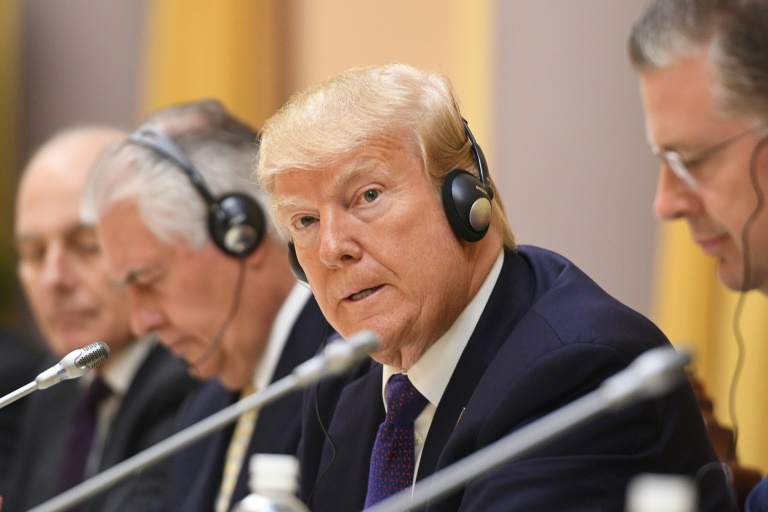Tzaneen crackdown: Eleven arrested in illegal business blitz
US President Donald Trump offered Sunday to mediate in a territorial dispute over the resource-rich South China Sea, after years of Chinese island-building in the contested waters.
Trump’s surprise proposal to insert himself into the decades-long row risked a backlash from China, which has repeatedly said the United States has no role to play in what it insists is a series of bilateral issues.
“If I can help mediate or arbitrate, please let me know… I am a very good mediator,” Trump told Vietnamese President Tran Dai Quang in Hanoi during an official state visit.
Hours later, the Communist leaders of China and Vietnam said they had reached a “consensus” on handling the disputed waters during a state visit by Chinese President Xi Jinping to Hanoi, according to the official Chinese news agency Xinhua.
The countries “reached an important consensus in accordance with leaders of the two parties and countries, to appropriately manage maritime issues, steadily advance all forms of maritime cooperation, including joint development and jointly strive to uphold peace and stability in the South China Sea,” Xinhua reported.
China claims nearly all of the strategically vital sea, through which $5 trillion in shipping trade passes annually. It is also believed to sit atop vast oil and gas deposits.

US President Donald Trump attends a bilateral meeting at the Presidential Palace in Hanoi on November 12, 2017
Vietnam, the Philippines, Malaysia, Brunei and Taiwan also have claims in the sea, and the dispute has long been seen as a potential trigger for conflict in Asia.
Vietnam has courted support from Washington in the row, as it and other claimants have been powerless to stop China’s efforts in recent years to cement its claims by building artificial islands in disputed areas.
Those islands are capable of serving as military bases, and some of the rival claimants are concerned that China will soon establish de facto control of the waters.
Tensions spiked this year when Vietnam suspended an oil exploration project in an area of the sea also claimed by Beijing, reportedly over pressure from its powerhouse communist neighbour.
In 2014, China moved an oil rig into waters off Vietnam’s coast, sparking violent protests in several Vietnamese cities.
Trump’s offer came just before he flew to the Philippine capital of Manila for another regional summit.
– Thanks, but… –
However, his proposal was not immediately accepted by the Philippines, which under President Rodrigo Duterte has sought to defuse tensions with China over the row in favour of closer economic ties.
US President Donald Trump arrives in the presidential limo, nicknamed The Beast, for a welcoming ceremony at the Presidential Palace in Hanoi on November 12, 2017
“We thank him for it. It’s a very kind, generous offer because he is a good mediator. He is the master of the art of the deal,” Philippine Foreign Affairs Secretary Alan Peter Cayetano said when asked about Trump’s offer.
“But of course the claimant countries have to answer as a group or individually and not one country can just give an instant reply because mediation involves all of the claimants and non-claimants.”
Philippine President Rodrigo Duterte said he had discussed the dispute with Xi when they met on the sidelines of APEC in the Vietnamese city of Danang on Saturday.
“He assured us again: ‘Do not worry, you have all the rights of safe passage. That will also be applicable to all countries’,” Duterte told reporters after arriving back in Manila.
But that assurance appeared to be based on a premise of China controlling the waters, and whether it would allow other countries to pass through them.
On Monday China and ASEAN are expected to announce in Manila that they have agreed to begin talks on a code of conduct for the sea.
Chinese Premier Li Keqiang will promote the agreement as an important breakthrough, Filipino foreign department spokesman Robespierre Bolivar told reporters last week.
US President Donald Trump, accompanied by his Vietnamese counterpart Tran Dai Quang, observe national anthems during a welcoming ceremony at the Presidential Palace in Hanoi on November 12, 2017
However, the talks are not expected to begin until “sometime next year” and, at China’s insistence, any agreement will not be legally binding, Bolivar said.
Vietnam had been pushing for the code to be legally binding. But with the Philippines acceding to China’s demands, ASEAN agreed in August that it would not have any legal force.
China agreed in 2002 to begin talks on a code, but has delayed actually doing so while carrying out its expansionist strategy.
Download our app